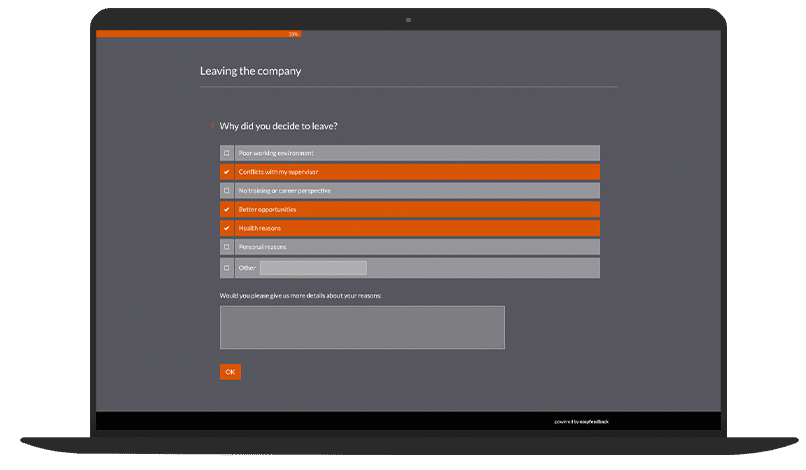Goals of an exit interview
A well-structured exit interview should pursue the following main goals:
1st goal: Understand the reasons for leaving
Was it a better career opportunity, dissatisfaction, or a personal decision?

A detailed understanding of the reasons behind this can help prevent future resignations.
2nd goal: Analyze the corporate culture
Are there recurring problems that lead to staff turnover?
High staff turnover can be an indicator of structural problems.
3rd goal: Identify potential for improvement
Which processes or structures could be optimized?
Employees who leave the company often speak more openly about difficulties than those who stay.
4th goal: Maintain relationships with employees
A professional and respectful separation can facilitate future cooperation or a return to the company.

A positive exit experience also ensures a good employer rating and recommendation.
The right preparation
A successful exit interview begins with careful planning:
Who will conduct the interview?
Ideally, a neutral HR employee to enable honest feedback.
In some cases, managers can cause inhibitions when criticism of management is to be expressed.

When should it take place?
Shortly before the last day of work, in order to capture current impressions, but not so late that the employee has already mentally checked out.
Where should it be conducted?
In a relaxed atmosphere, without pressure or stress.
A confidential setting encourages more open discussions.
How can a preliminary survey help?
An anonymous survey conducted before the interview can help to gain initial insights and focus the discussion on critical issues.
This allows the interviewer to follow up specifically and address topics that have already been mentioned.

Important questions for an effective exit interview
The interview should be structured, but not too formal.
Some key questions could be:
- What did you like most about your job?
- Were there any challenges or frustrations that influenced your decision?
- How did you experience leadership and collaboration within the company?
- What suggestions do you have for improving our work culture?
- Would you recommend the company as an employer?
- What might have motivated you to stay with the company?
Tips for a successful exit interview
Tip 1: Active listening
It is important to listen attentively to the employee and let them finish speaking.
Nodding in agreement or asking specific questions can signal that their feedback is appreciated.
This creates an open dialogue that encourages honest answers.

Tip 2: Maintain a neutral stance
Even if criticism is expressed, the interviewer should not adopt a defensive stance.
Instead, it is advisable to create an open, non-judgmental atmosphere in which the employee can express themselves freely.
Tip 3: Ask specific questions
Open-ended questions help to gain deeper insights into the employee’s motivations.
Instead of asking closed yes/no questions, use phrases such as “Can you give an example?” or “What could have been done better?”
Tip 4: Don’t just document, take action
The insights gathered should not only be recorded, but actively used to improve the company.
This can be done through regular internal analyses and concrete measures to optimize the corporate culture.
Tip 5: Follow-up by the HR team
All collected data should be analyzed and evaluated regularly in order to identify trends at an early stage.

If recurring problems become apparent, these should be discussed with management and solutions worked out.
Tip 6: Express gratitude
Even if an employee leaves the company, it is important to thank them for their work and honest feedback.
This leaves a positive impression and strengthens employer branding.
Tip 7: Keep future options open
Sometimes employees return after a certain period of time.
A professional and respectful farewell increases the chances that former employees will retain positive memories of the company and possibly reapply.
Dealing with feedback
The most important step after the interview is to evaluate and utilize the insights gained:
- Analyze patterns:
Are certain points of criticism recurring? If so, these should be addressed systematically. - Make adjustments:
Can internal processes or the corporate culture be improved? If so, there should be a clear action plan. - Promote open communication:
Transparency in dealing with feedback shows employees that their opinion matters and leads to greater trust and loyalty in the long term.
Conclusion
A professionally conducted exit interview is a valuable opportunity to learn from departing employees and improve the company in the long term.
Through open communication, targeted questions, and structured follow-up, valuable insights can be gained that contribute to better employee retention and a positive corporate culture in the long term.
A preliminary survey can help make the conversation more effective.
A respectful farewell can also keep the door open for a later return or a positive recommendation.
More on the topic of exit interviews
- Exit interview with employees: See farewell as an opportunity
- Creative questions for an exit interview




